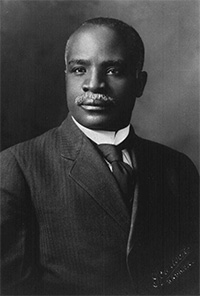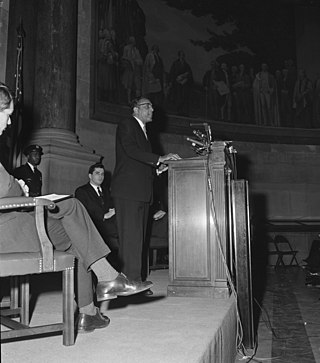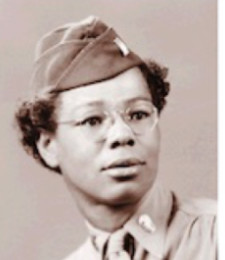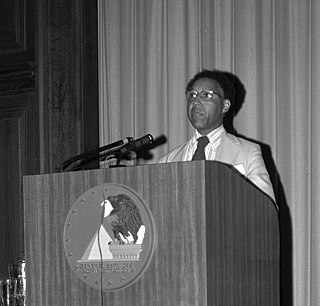
Black studies or Africana studies, is an interdisciplinary academic field that primarily focuses on the study of the history, culture, and politics of the peoples of the African diaspora and Africa. The field includes scholars of African-American, Afro-Canadian, Afro-Caribbean, Afro-Latino, Afro-European, Afro-Asian, African Australian, and African literature, history, politics, and religion as well as those from disciplines, such as sociology, anthropology, cultural studies, psychology, education, and many other disciplines within the humanities and social sciences. The field also uses various types of research methods.

Kelly Miller was an American mathematician, sociologist, essayist, newspaper columnist, author, and an important figure in the intellectual life of black America for close to half a century. He was known as "the Bard of the Potomac".

Edward Franklin Frazier, was an American sociologist and author, publishing as E. Franklin Frazier. His 1932 Ph.D. dissertation was published as a book titled The Negro Family in the United States (1939); it analyzed the historical forces that influenced the development of the African-American family from the time of slavery to the mid-1930s. The book was awarded the 1940 Anisfield-Wolf Book Award for the most significant work in the field of race relations. It was among the first sociological works on Black people researched and written by a black person.

David C. Driskell was an American artist, scholar and curator recognized for his work in establishing African-American Art as a distinct field of study. In his lifetime, Driskell was cited as one of the world's leading authorities on the subject of African-American Art. Driskell held the title of Distinguished University Professor of Art Emeritus at the University of Maryland, College Park. The David C. Driskell Center at the University of Maryland, is named in his honor.

Charles Harris Wesley was an American historian, educator, minister, and author. He published more than 15 books on African-American history, taught for decades at Howard University, and served as president of Wilberforce University, and founding president of Central State University, both in Ohio.

Harry Haywood was an American political activist who was a leading figure in both the Communist Party of the United States (CPUSA) and the Communist Party of the Soviet Union (CPSU). His goal was to connect the political philosophy of the Communist Party with the issues of race.

John Gibbs St. Clair Drake was an African-American sociologist and anthropologist whose scholarship and activism led him to document much of the social turmoil of the 1960s, establish some of the first Black Studies programs in American universities, and contribute to the independence movement in Ghana. Drake often wrote about challenges and achievements in race relations as a result of his extensive research.
Ronald W. Walters was an American author, speaker and scholar of African-American politics. He was director of the African American Leadership Institute and Scholar Practitioner Program, Distinguished Leadership Scholar at the James MacGregor Burns Academy of Leadership, and professor in government and politics at the University of Maryland.
Benjamin Arthur Quarles was an American historian, administrator, educator, and writer, whose scholarship centered on black American social and political history. Major books by Quarles include The Negro in the Civil War (1953), The Negro in the American Revolution (1961), Lincoln and the Negro (1962), and Black Abolitionists (1969). He demonstrated that blacks were active participants in major conflicts and issues of American history. His books were narrative accounts of critical wartime periods that focused on how blacks interacted with their white allies and emphasized blacks' acting as vital agents of change rather than receiving favors from whites.
Carl Murphy was an African-American journalist, publisher, civil rights leader, and educator. He was publisher of the Afro-American newspaper chain of Baltimore, Maryland, expanding its coverage with regional editions in several major cities of the Washington, D.C., area, as well as Newark, New Jersey, a destination of thousands of rural blacks in the Great Migration to the North.
William L. Van Deburg was the Evjue-Bascom Professor of Afro-American Studies at the University of Wisconsin-Madison. He has written on antebellum slavery, on the history of black nationalism, and on contemporary African-American popular culture. Van Deburg retired from teaching in 2008 and is currently Professor Emeritus.

The National Afro-American Council was the first nationwide civil rights organization in the United States, created in 1898 in Rochester, New York. Before its dissolution a decade later, the Council provided both the first national arena for discussion of critical issues for African Americans and a training ground for some of the nation's most famous civil rights leaders in the 1910s, 1920s, and beyond.

Emory J. Tolbert (1946-2022) was an American historian, educator, and activist. His scholarship centers on Marcus Garvey and Garveyism, as well as wider aspects of African American history.

Martha Settle Putney was an American educator and historian who chronicled the roles of African Americans in the armed forces. After serving as one of the first black members of the Women's Army Corps during World War II, she devoted her life to researching and documenting the military service and achievements of black Americans.
Anthony John Russell Russell-Wood was a leading historian of colonial Brazil, the Portuguese Empire, and the broader Luso-Brazilian world.
Arthur Paul Davis was an influential American university professor, literary scholar, and the writer and editor of several important critical texts such as The Negro Caravan, The New Cavalcade, and From the Dark Tower: Afro-American Writers 1900–1960. He was African-American. Influenced by the Harlem Renaissance, Davis has inspired many African-Americans to pursue literature and the arts.

Evelyn Brooks Higginbotham is an American academic who is professor of Afro-American Studies, African American Religion and the Victor S. Thomas Professor of History and African American Studies at Harvard University. Higginbotham wrote Righteous Discontent: The Women's Movement in the Black Baptist Church: 1880–1920, which won several awards. She has also received several awards for her work, most notably the 2014 National Humanities Medal.
Stephanie Elaine Pogue (1944–2002) was an American professor, printmaker, artist, and curator. Her artistic interests included the portrayal of women and the human figure.

Roland C. McConnell (1910-2007) was a Canadian-born American archivist, historian and author.
Miriam DeCosta-Willis was an American educator, writer, and civil rights activist. The first African-American faculty member at Memphis State University, having previously been denied admission to the school as a graduate student due to her race, she spent her career as a professor of Romance languages and African-American studies at a variety of colleges in Memphis, Tennessee, and the Washington, D.C., area. She published more than a dozen books throughout her career, largely dealing with Afro-Latino literature and Black Memphis history.











